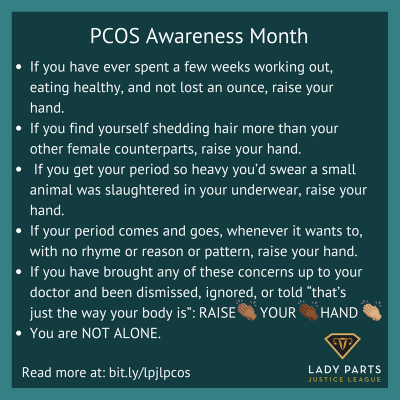It's #PCOSAwarenessMonth! This #DailyTakedown piece was originally posted on the LPJL blog on September 18, 2017, and as we continue to fight for reproductive freedom, it remains as relevant as ever. With HHS's purposed Title X changes, low income patients who rely on federal Title X funding to access contraception and other essential health care will directly be affected.
************************
Today's #DailyTakedown is brought to you by badass health teacher and guest contributor, Christina Valcarel – Mikijanic
If you have ever spent a few weeks working out, eating healthy, and not lost an ounce, raise your hand. If you find yourself shedding hair more than your other female counterparts, raise your hand. If you find yourself tweezing more than a few whiskers or nipple hairs, raise your hand. If you get your period so heavy you’d swear a small animal was slaughtered in your underwear, raise your hand. If your period comes and goes, whenever it wants to, with no rhyme or reason or pattern, raise your hand. If you have brought any of these concerns up to your doctor and been dismissed, ignored, or told “that’s just the way your body is”: RAISE (clap) YOUR (clap) HAND (clap). And you are NOT ALONE.
Polycystic Ovarian Syndrome (PCOS) supposedly affects 1 in 10 women and is the main cause of infertility in women. I say supposedly because, in my very humble and personal opinion, more than 1 in 10 women experience the symptoms listed above, and don’t know to follow up and pester their doctors into follow up tests to receive an actual diagnosis. Not that we should HAVE TO pester a doctor into taking the time to see us as a whole picture and take the time to actually give us a diagnosis. But I digress… Let’s take a look at what PCOS actually is and what it does.
So, in a nutshell, PCOS is an endocrine disorder (like diabetes). It’s not specifically dealing with the ovaries – it’s a much bigger, broader picture. To be diagnosed with PCOS you need two of the following:
- Cysts on your ovaries
- Signs of high progesterone/testosterone
- Irregular menstrual cycle
(excess body hair, weight gain/ trouble losing weight, and high blood glucose are also strong indicators)
Any combination of these should be enough of a red flag for your doctor to run some further tests, although (again in my humble opinion) a lot of doctors don’t know enough about PCOS to realize these are markers. Or maybe we are too quick to accept that “this is how our bodies are” and we don’t push the issue, because women in our society have been taught to play nice… but again, I digress.
Now that we understand the markers, how do they all fit together? (And this is where it’s really amazing how the human body works.)
The pancreas starts to super crank out insulin, more than we should need, because the cells of the body are not absorbing sugar. This is called being insulin resistant. The main job of insulin is to unlock the body’s cells (any and all of them) and escort the glucose into the cell for energy. When the cells decide “No, thank you” the glucose stays in the blood. Which leads to a high blood sugar indicator on your blood test. Glucose in the blood then makes the pancreas crank out more insulin, which in turn leads to excess insulin in your system, making you hungry. You are hungry, so you eat more, which leads to more glucose in the blood. It’s a vicious cycle. Additionally, increases in insulin within the body also trigger your ovaries to produce too much progesterone. This will affect cycle regularity and also leads to irregular ovulation. MEANWHILE, your cells are not getting as much energy as they need, so while you might be eating enough to power you through a marathon, after actually running a mile your body goes – “Fuck this, we’re done here”.
You ovulate when the estrogen in your cycle hits it’s peak. When your progesterone levels are out of whack, this can affect the amount of time it takes to hit your peak – which leads to periods coming on with no rhyme or reason. Additionally, you may get a period without actually ovulating at all. As you progress through your cycle, your ovary starts to mature many eggs – called follicles (I believe the average is 12 follicles between the two ovaries, but in a person with PCOS that number can be much MUCH higher). Eventually, with the development of these follicles, one will really take off and actually release an egg. After this happens, this follicle and the other ones that were developing shrivel back and become what is known as the corpus luteus. The corpus luteus is shaped like a lifesaver and sometimes the center of the lifesaver can become filled with fluid (creating a cyst). Excess follicle production can cause ovulation to be a little uncomfortable and some people might feel cramping or discomfort in their ovaries while the follicles are developing.
So how does this work together? Insulin and progesterone go up, cells don’t get the energy that they need, increased insulin makes you hungry so you eat, more sugar in the blood, more insulin, more hangry-ness going on, more progesterone in the system, more irregularity in the cycle, and in a lot of cases weight gain from eating and the body not working correctly to burn it off.
This is enough to make anyone’s head spin, so it’s no surprise that women with PCOS are at a higher risk for depression, anxiety, diabetes, obesity, heart attack, and certain kinds of cancer.
So, when you get a diagnosis, what is the answer? How do you treat it? Many doctors will say, “Well, if you can lose weight, your hormones should regulate.” Fuck you. Some will say, “Birth control pills will help regulate the hormones.” This is like putting a bandaid on a wound that needs stitches. It masks the hormone imbalance and perpetuates it by adding hormones to your system. Although the birth control can be helpful if you are trying to manage the cysts that may be developing. You might hear, “Stress management might help because stress increases your progesterone…” ::Evil side eye while you consider everything you already do to manage your stress:: Some doctors will say, “You can try cutting out gluten, soy, dairy, and processed sugars.” The thought process behind this might be that excess soy converts to estrogen in your system, dairy stimulates progesterone production (and mucous production), and processed sugars would drive up your blood glucose level and agitate your insulin production. You can try tackle the symptoms by using medications that address the symptoms in its side effects, but many of these medications cannot be used while you are pregnant. And a lot of PCOS diagnoses occur while people are trying to get pregnant.
Right now, the cutting edge medication and treatment is Metformin. Metformin is a diabetes drug that reminds the cells that they want to process the blood glucose for energy. Blood sugar levels come down and insulin levels calm down because the cells are letting the insulin escort the sugar through. When insulin levels come down to a normal level they also stop jacking up progesterone levels. But this is not the solution for everyone.
So where do we go from here and what do we do? If you think you have any symptoms, take your concerns to your doctor (your GP or OB/GYN), express your concern about your symptoms and ask for a full blood panel – specifically make sure the panel will cover your progesterone, blood glucose, and DHEA levels. Based on the results of the test, and other symptoms you might have, your doctor may make a diagnosis or may refer you to the Endocrinologist (where you will need to repeat the cycle again before a diagnosis). Yes, it’s annoying, but at the end of the day, our bodies need us to advocate for them. Life is too short to spend it hating your body and agonizing over why it just can’t be “normal”. Knowledge is power and the more you know, the better you can understand your body and make the best health decisions for you.





